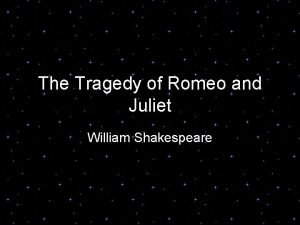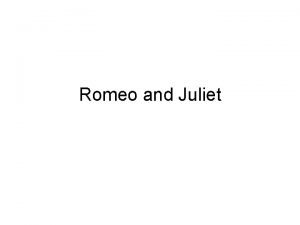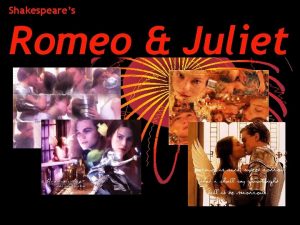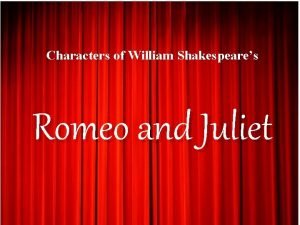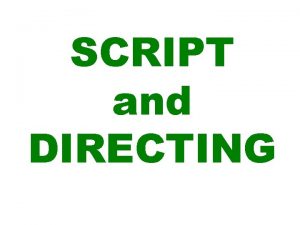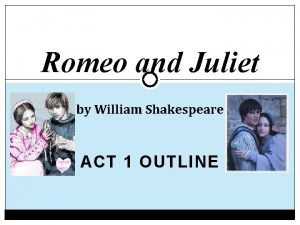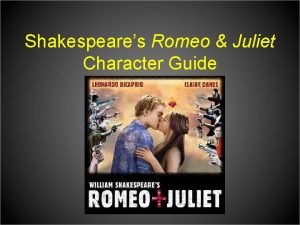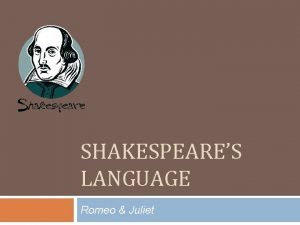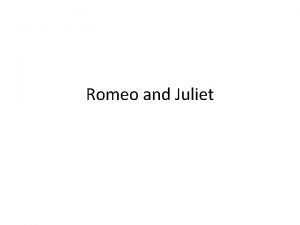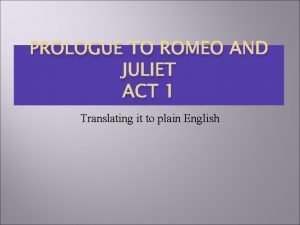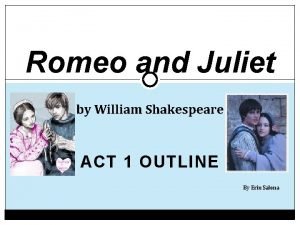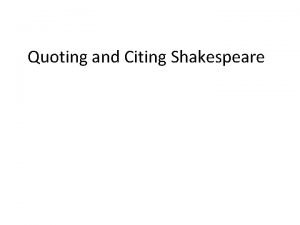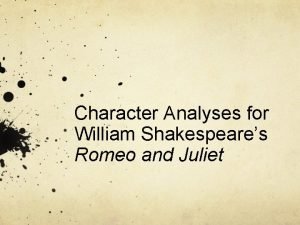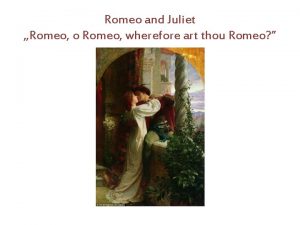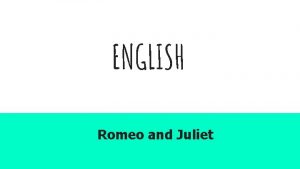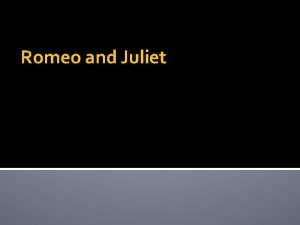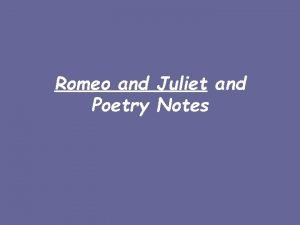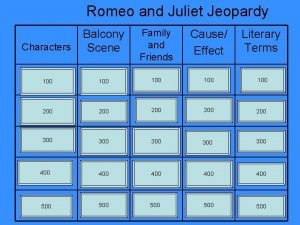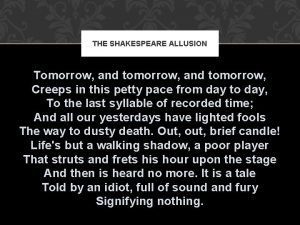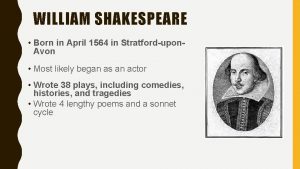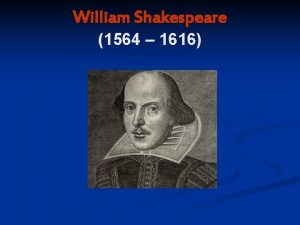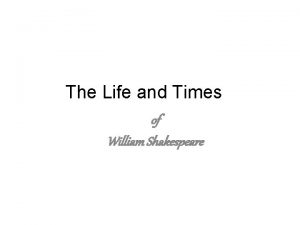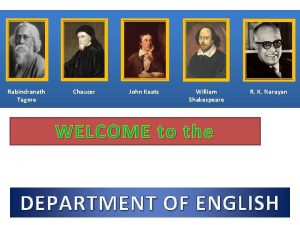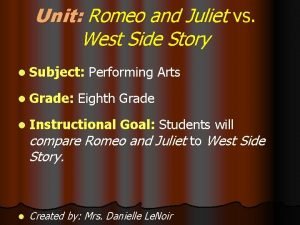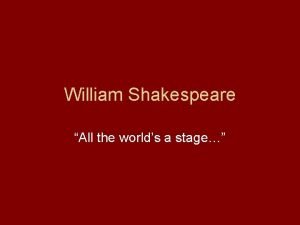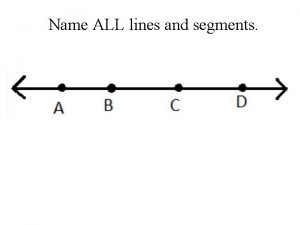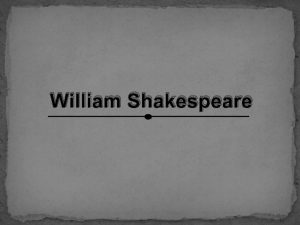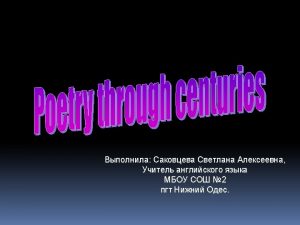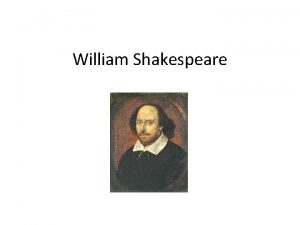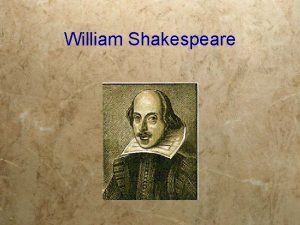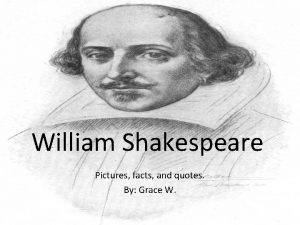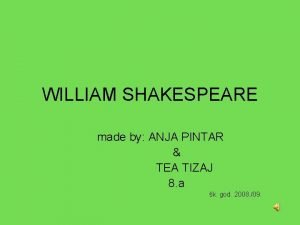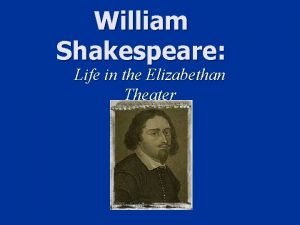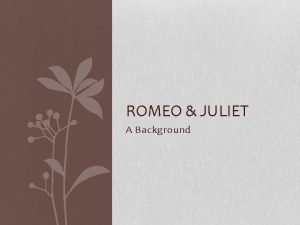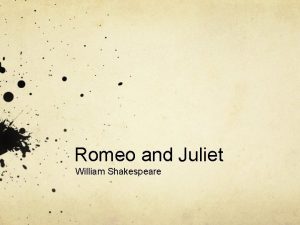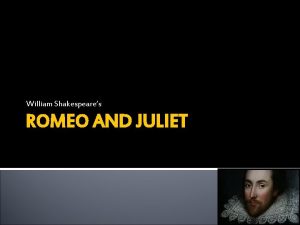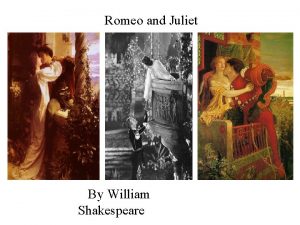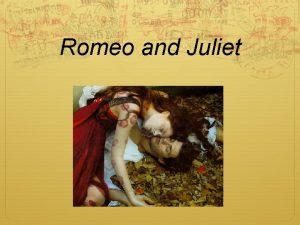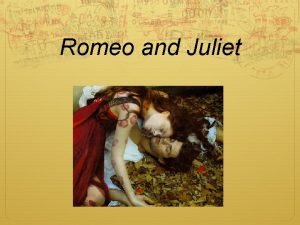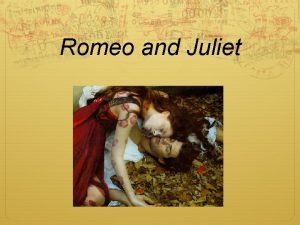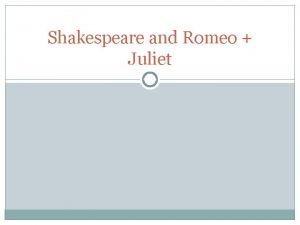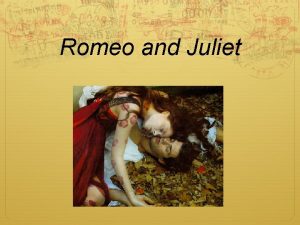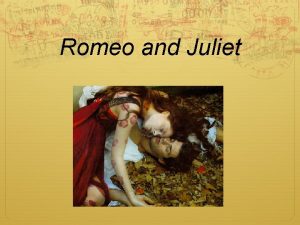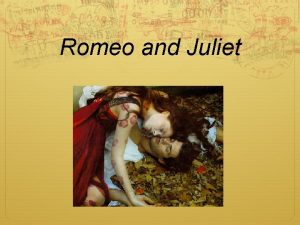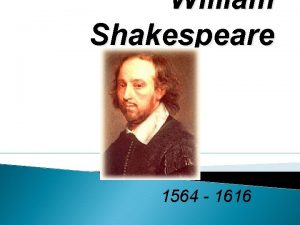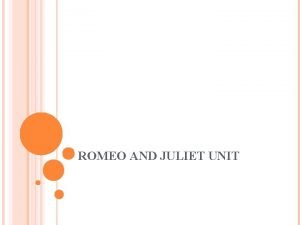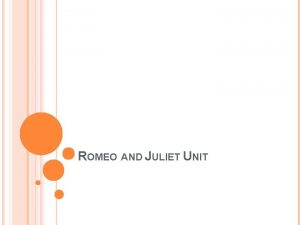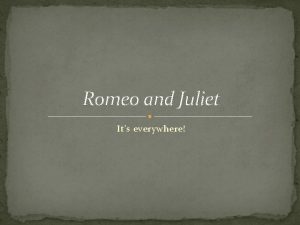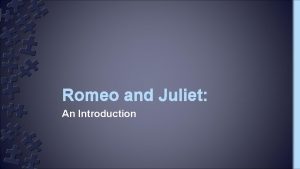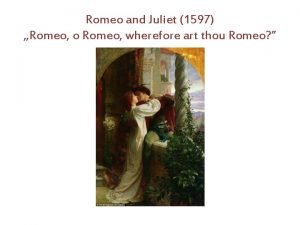William Shakespeare Romeo and Juliet All the worlds









































- Slides: 41

William Shakespeare Romeo and Juliet

“All the world’s a stage, And all the men and women merely players…” (from As You Like It)

William Shakespeare l “He was not of an age, but for all time. ” (Ben Jonson) l Shakespeare is considered the best playwright who ever lived. l Understood “universal” themes (joy, fear, hope, passion, hate, weakness)

William Shakespeare l Responsible for adding as many as 3, 000 words and phrases (still commonly used) to our English language.

Shakespeare’s Early Years l Birth: April 23 (? ), 1564 *** l Location: Stratford (-Upon-Avon) l John Shakespeare (his father) was a shopkeeper and also a town official. l Mary Shakespeare (his mother) was the daughter of a gentleman (a fairly wealthy landowner).

Shakespeare’s Early Years l Schooling: William was allowed to go to school until the age of 13 when his father lost money (many think because of “shady” dealings) and William was taken out of school. l What then? Many reports say he was apprenticed to either a butcher or a tanner (worked with leather).

Shakespeare’s Early Years Marriage & Family: l Wife: Anne Hathaway (daughter of a nearby farmer; she was 26 and William was 18 when married…Anne was pregnant!) l Children: Susanna (born in 1583) Hamnet and Judith (twins born in 1585) (Hamnet dies at age 11, leaving William without a male heir!)

Shakespeare’s Early Years “The Lost Years”: 1585 to 1590 l l There is not much record of what William was doing during this period (some thought he stayed home with children, some thought might have taught school) he By 1590, records show that William is living in London (his family is still in Stratford).

Shakespeare’s Career l Theater Companies: Lord Chamberlain’s Company: (William was a shareholder in this acting company and he was both acting and writing plays) The King’s Men: after the death of Queen Elizabeth I, her cousin James renames the company and makes it the official company of the king

Shakespeare’s Career l Fame: l. Shakespeare wrote 37 plays (*controversy still exists as to whether he wrote them all) l. Shakespeare wrote 3 types of plays… main

Shakespeare’s Career l History Plays (often about famous kings and leaders); he blended facts from their lives with his own imagination l Examples: Henry V Richard III

Shakespeare’s Career l Comedy Plays: a Shakespearean comedy has a happy ending and usually involves a marriage (also mistaken identities, intertwining plots, clever puns, etc. ) l Examples: A Midsummer Night’s Dream As You Like It Taming of the Shrew

Shakespeare’s Career l Tragedy Plays (Shakespeare is most famous for these) Examples: Romeo and Juliet Hamlet Macbeth Julius Caesar

Shakespeare’s Final Years l Shakespeare retired to Stratford (he was very wealthy and well-honored) l Death: April 23*, 1616 (his birthday)

The Elizabethan Era n Renaissance = “rebirth” (from French) n Dates: 1350 – 1600 (approximately) n Education: schools taught primarily Latin and studied the Bible

The Elizabethan Era Queen Elizabeth I *reigned from - 1603 (45 years!) 1558

The Elizabethan Era Under Queen Elizabeth’s reign, England becomes the dominant world power: exploration (power on the sea w/ navy) n the Arts flourished (literature, painting, theater, music) n classical Greece and Rome were rediscovered (“cultured” societies) n

The Wooden “O”



The Globe Theatre Location and History: § built in 1599 § competed against several rival theatre companies and closings (because of the plague!)

The Globe Theatre Characteristics: § Shape: 8 -sided frame with a central yard open to the sky § No curtain: scenes flowed swiftly from one to the other without interruption

The Globe Theatre Characteristics: § No lighting: plays were held in the afternoon (any darkness/night would have to be imagined (and often was cued by descriptions Shakespeare put into his plays)

The Globe Theatre Characteristics: § Little scenery: there was not enough time to change any sets § Expensive costumes: most of the money was spent on these for each play

The Globe Theatre Characteristics: § All women’s parts were played by males: it was considered indecent and scandalous for any woman to perform on a stage!

The Globe Theatre Characteristics: § Cost of admission: § the “Groundlings” paid one penny but had to stand in the open yard for the entire play § the first floor gallery paid either three or six cents (the best seats) § the second and third floor galleries paid two pennies for admission



Drama Necessary elements for a play: script (the play) actors (the performers) audience (the people to watch)

Drama Difficulties and Suggestions for Reading: script/written form: which is not how any play is meant to be experienced (readers have to create scenes and characters in their own minds and imagine costumes and emotions)

Drama Difficulties and Suggestions for Reading: a lot of poetry: unrhymed iambic pentameter (blank verse) and a lot of figurative language may be difficult for many students

Drama Difficulties and Suggestions for Reading: age of works: (how old the play is); language and meanings of words have changed in the last 400 years (the sidenotes in the play will help you with these “archaic” words and expressions)

Drama Difficulties and Suggestions for Reading: Romeo and Juliet: written in both Prose (spoken mostly by common people and occasionally Mercutio) Poetry (spoken by the majority of characters…a sign of higher status)

Drama Difficulties and Suggestions for Reading: Reading the lines: we have all heard people who ruin a good poem by mechanically pausing at the end of each line, whether or not the meaning of the line called for a pause…

Drama Difficulties and Suggestions for Reading: lines of poetry are either: end-stopped: has some form of punctuation at its end run-on: has no punctuation at its end; the meaning is always completed in the line(s) that follow

Dramatic “tragedy” Definition: a literary work dealing with very serious and important themes, in which a dignified tragic figure meets destruction, usually through some personal flaw or weakness, or it may result from forces beyond human control

Dramatic “tragedy” Shakespeare’s Play Plot Structure: every Shakespearean play consists of 5 acts (divided into smaller scenes) which correspond to the classic plot structure studied with short stories

Classic Plot Structure = Shakespearean Play Plot Line Act III Act IV Act V

Classic Plot Structure = Shakespearean Play Plot Line Act III Act IV Act III of a Shakespearean play will reveal whether the play is a comedy or tragedy.

Drama Play Notation: (references) to reference lines of a play, use the Act (uppercase Roman numerals), Scene (lowercase Roman numerals), and Line numbers (regular numbers) Sample: Act IV, Scene ii, Lines 236 IV. ii. 236

Drama Terms There are 25 drama terms in your packet that you are expected to know and learn from this unit (they will be on your semester test). We will cover these as we progress throughout the play. Some you will know already; others will be new to you.
 Juliet
Juliet The tragedy of romeo and juliet by william shakespeare
The tragedy of romeo and juliet by william shakespeare Shakespeare romeo and juliet poem
Shakespeare romeo and juliet poem William shakespeare wrote romeo and juliet
William shakespeare wrote romeo and juliet Facts about romeo
Facts about romeo Romeo and juliet tbc
Romeo and juliet tbc Romeo and juliet scripts
Romeo and juliet scripts Tybalt act 1
Tybalt act 1 Worlds together worlds apart 4th edition
Worlds together worlds apart 4th edition Character traits for romeo
Character traits for romeo Romeo and juliet blank verse
Romeo and juliet blank verse Shakespeare romeo and juliet sonnet
Shakespeare romeo and juliet sonnet Is now the two hours’ traffic of our stage modern english
Is now the two hours’ traffic of our stage modern english Setting of act 1 scene 4 romeo and juliet
Setting of act 1 scene 4 romeo and juliet Theme of romeo and juliet
Theme of romeo and juliet How to cite shakespeare play
How to cite shakespeare play Mercutio meaning
Mercutio meaning Romeo wherefore art thou
Romeo wherefore art thou Romeo and juliet important quotes act 1
Romeo and juliet important quotes act 1 Unhappy fortune by my brotherhood
Unhappy fortune by my brotherhood Romeo and juliet couplet
Romeo and juliet couplet Shakespeare contractions
Shakespeare contractions Juliet jeopardy
Juliet jeopardy What does tomorrow and tomorrow and tomorrow mean
What does tomorrow and tomorrow and tomorrow mean When was shakespeare born
When was shakespeare born Shakespeare was born on april 23, 1564
Shakespeare was born on april 23, 1564 When was william shakespeare born and died
When was william shakespeare born and died Life and times of william shakespeare
Life and times of william shakespeare Rabindranath tagore and shakespeare
Rabindranath tagore and shakespeare Compare and contrast west side story and romeo and juliet
Compare and contrast west side story and romeo and juliet All the worlds a stage
All the worlds a stage All the worlds a stage
All the worlds a stage Name three lines
Name three lines Shakespeare born
Shakespeare born Othello webquest
Othello webquest Who is called the bard
Who is called the bard William shakespeare life timeline
William shakespeare life timeline Shakespeare early years
Shakespeare early years William shakespeare pictures
William shakespeare pictures William shakespeare family tree
William shakespeare family tree Fun facts about william shakespeare
Fun facts about william shakespeare Shakespeare as a poet of nature
Shakespeare as a poet of nature
